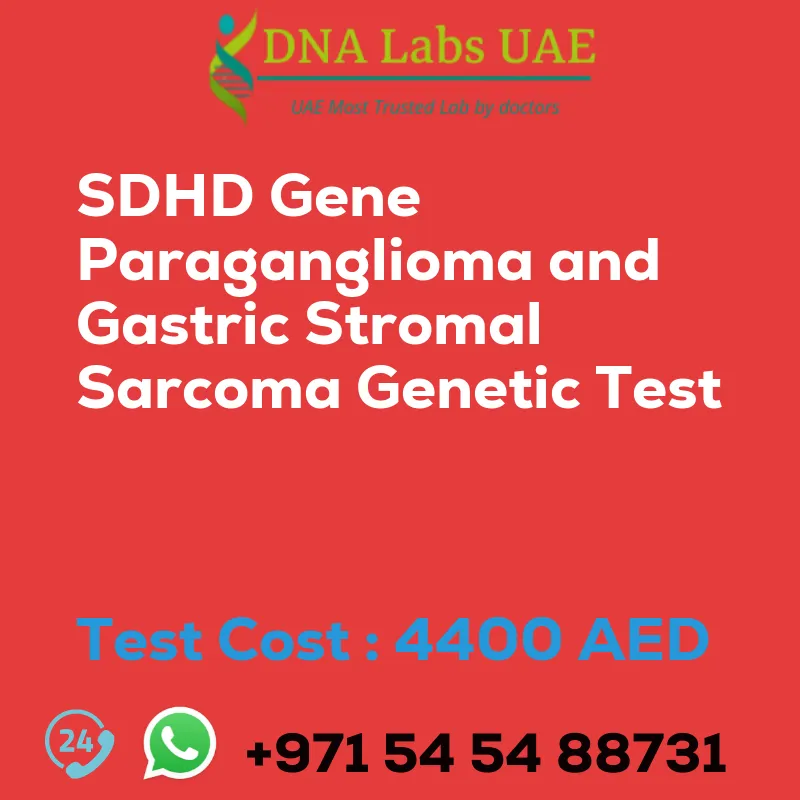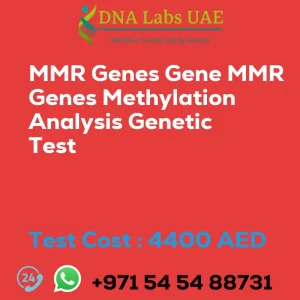SDHD Gene Paraganglioma and Gastric Stromal Sarcoma Genetic Test
At DNA Labs UAE, we offer the SDHD Gene Paraganglioma and Gastric Stromal Sarcoma Genetic Test to help individuals identify their risk for these types of tumors. This test is designed to analyze the SDHD gene for any mutations or variations that may be present.
Test Details
The SDHD gene is associated with two different types of tumors – paraganglioma and gastric stromal sarcoma. Paragangliomas are tumors that develop from the cells of the paraganglia, which are located near certain blood vessels and nerves. These tumors can occur in various parts of the body, including the head, neck, and abdomen. Gastric stromal sarcoma, on the other hand, is a tumor that arises from the connective tissue cells in the stomach.
NGS (Next-Generation Sequencing) genetic testing is used to analyze the DNA sequence of multiple genes, including the SDHD gene, to identify any mutations or variations. This type of testing is more comprehensive and efficient compared to traditional sequencing methods, as it can analyze multiple genes simultaneously.
Test Components
- Test Name: SDHD Gene Paraganglioma and Gastric Stromal Sarcoma Genetic Test
- Price: 4400.0 AED
- Sample Condition: Blood or Extracted DNA or One drop Blood on FTA Card
- Report Delivery: 3 to 4 Weeks
- Method: NGS Technology
- Test Type: Cancer
- Doctor: Oncologist
- Test Department: Genetics
Pre Test Information
Prior to undergoing the SDHD Gene Paraganglioma and Gastric Stromal Sarcoma Genetic Test, it is important for the patient to provide their clinical history. Additionally, a genetic counseling session may be conducted to draw a pedigree chart of family members affected by SDHD Gene Paraganglioma and Gastric Stromal Sarcoma. This will help in understanding the genetic inheritance pattern and assessing the risk for developing these tumors.
Benefits of the Test
By identifying mutations in the SDHD gene through NGS genetic testing, individuals at risk for SDHD Gene Paraganglioma and Gastric Stromal Sarcoma can be identified. This information can be used for early detection, surveillance, and management of these tumors. Furthermore, it can also assist in guiding treatment decisions, as certain targeted therapies may be more effective in individuals with specific genetic mutations.
Don’t wait until it’s too late. Take control of your health and schedule your SDHD Gene Paraganglioma and Gastric Stromal Sarcoma Genetic Test with DNA Labs UAE today!
| Test Name | SDHD Gene Paraganglioma and gastric stromal sarcoma Genetic Test |
|---|---|
| Components | |
| Price | 4400.0 AED |
| Sample Condition | Blood or Extracted DNA or One drop Blood on FTA Card |
| Report Delivery | 3 to 4 Weeks |
| Method | NGS Technology |
| Test type | Cancer |
| Doctor | Oncologist |
| Test Department: | Genetics |
| Pre Test Information | Clinical History of Patient who is going for SDHD Gene Paraganglioma and gastric stromal sarcoma NGS Genetic DNA Test. A Genetic Counselling session to draw a pedigree chart of family members affected with SDHD Gene Paraganglioma and gastric stromal sarcoma NGS Genetic DNA Test gene SDHD |
| Test Details | SDHD gene paraganglioma and gastric stromal sarcoma are two different types of tumors that can be caused by genetic mutations in the SDHD gene. NGS (Next-Generation Sequencing) genetic testing is a type of genetic test that can be used to identify mutations in multiple genes simultaneously. In the case of SDHD gene paraganglioma, mutations in the SDHD gene can lead to the development of paragangliomas, which are tumors that arise from the cells of the paraganglia, a cluster of cells located near certain blood vessels and nerves. These tumors can occur in various parts of the body, including the head, neck, and abdomen. Gastric stromal sarcoma, on the other hand, is a type of tumor that arises from the connective tissue cells in the stomach. Mutations in the SDHD gene have been implicated in the development of gastric stromal sarcoma, although the exact mechanism is not fully understood. NGS genetic testing can be used to analyze the DNA sequence of multiple genes, including the SDHD gene, to identify any mutations or variations that may be present. This type of testing is more comprehensive and efficient compared to traditional sequencing methods, as it can analyze multiple genes simultaneously. By identifying mutations in the SDHD gene through NGS genetic testing, individuals at risk for SDHD gene paraganglioma or gastric stromal sarcoma can be identified. This information can be used for early detection, surveillance, and management of these tumors. Additionally, it can also help guide treatment decisions, as certain targeted therapies may be more effective in individuals with specific genetic mutations. |







